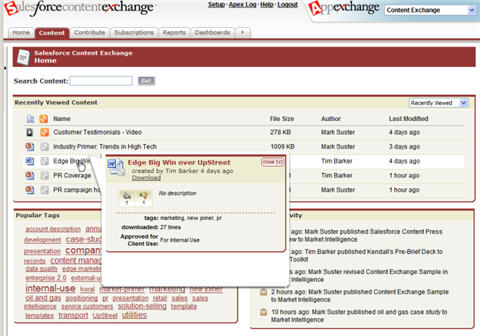Salesforce.com snags Koral’s Web 2.0 content management service

Salesforce.com has taken another drink from its AppExchange marketplace pool, acquiring nine-person startup Koral and its on demand content management service. Kendall Collins, senior vice president of product marketing for salesforce.com, described the new offering, dubbed Salesforce Content, as the new killer application.
Koral may not be a so-called killer app for the salesforce platform, but it is a strong addition that will make it more useful and continue the company's lead in building a broad-based software-as-a-service business application platform.
“We noticed that the unstructured data world is exploding-- video, HTML, office documents, and email are not structured in a database with schema and metadata. When we looked at solutions today, we found that the software industry has failed end users in sharing and finding content on corporate intranets,” Collins said.
Collins is right that unstructured data is exploding and that most of the content management solutions today haven’t taken advantage of Web 2.0 concepts—such as user supplied tags, RSS, comments ratings, recommendations and AJAX--to improve the user experience. Koral also has the bonus of already being integrated with salesforce.com’s CRM applications, and has been renamed Salesforce ContentExchange.

Within Salesforce.com CRM, documents can be connected to an account, lead, or opportunity. They can be previewed online and Koral also creates a tag cloud from community tagging efforts.
“Our strategy to look for technologies that will be broadly applicable to our customer base and core to customers,” Collins said.
It turns out that AppExchange is a fertile breeding ground, with salesforce.com poised to scoop up the best of breed from its ecosystem. Last year, salesforce.com acquired AppExchange participant Keiden, which integrates salesforce with Google AdWords.
“Keiden and Koral both have tremendous overlap with the CRM user base,” Collins continued. “An important part of our strategy is managing the 85 percent of information in the business world that salesforce doesn’t manage today. We want to manage all business information on demand. Our ecosystem can leverage the content management platform.”
Prior to the acquisition, Koral had about 1,500 free trial users of the service, which launched as a beta in October last year. The deal closed about two weeks ago, Collins said, but wouldn’t disclose what his company paid for Koral or the pricing and availability of the service. He allowed that in the last few weeks Koral has been more tightly woven into the salesforce.com user interface and moving the service into its data centers is a priority.
Koral allows users to access relevant documents within salesforce.com directly from an account, lead, or opportunity. Documents can be linked to a record for easy access throughout the sales cycle, and files can be previewed online. Koral also adds version control to salesforce.com, ensuring that users have the most current version of a document, and full text search, as well as filters and saved searches. Workgroups can set up virtual work spaces for collaborating on projects with sets of documents and library services for versioning, auditing and controlling rights and access to content.
Koral’s core technology will be exposed to developers, now called Apex Content. Collins said he expects to see applications for compliance, clinical trials, digital asset management and other areas.
Content Connect installs a snippet of code on the desktop to manage versions, automatically synching with the latest versions. Content can be added to an application by dragging and dropping it into Content Connect, and ContentExchange automatically recommends how to classify the documents in the index.
See also Zoli's blog for a review Koral and Robert Scoble's interview with Koral CEO Mark Suster.